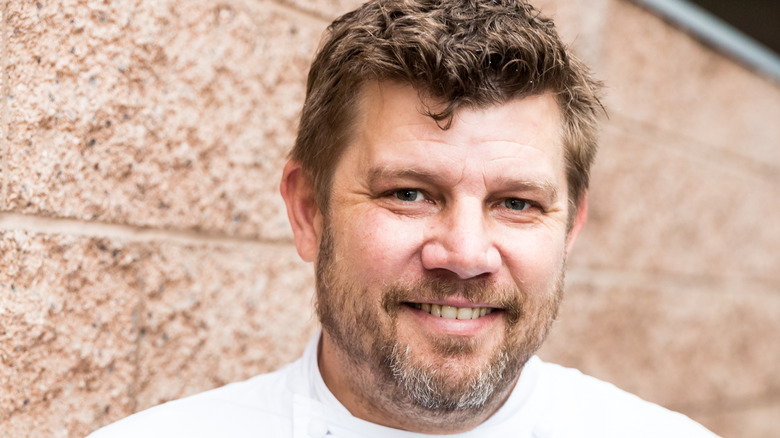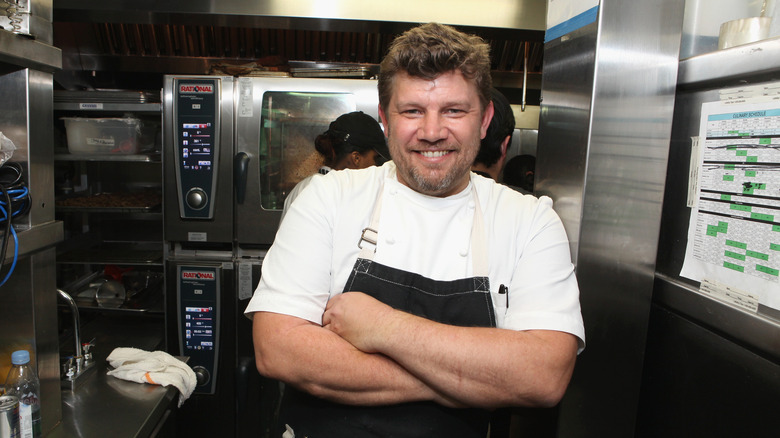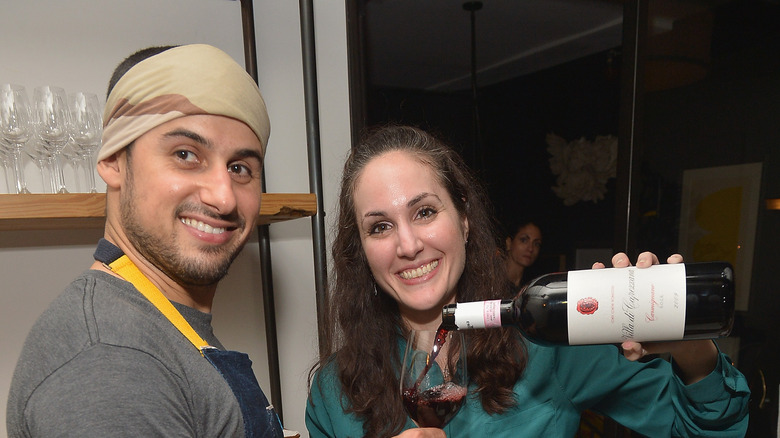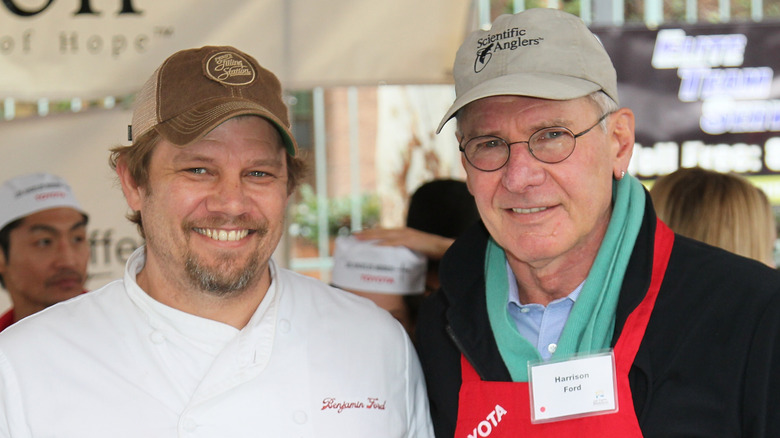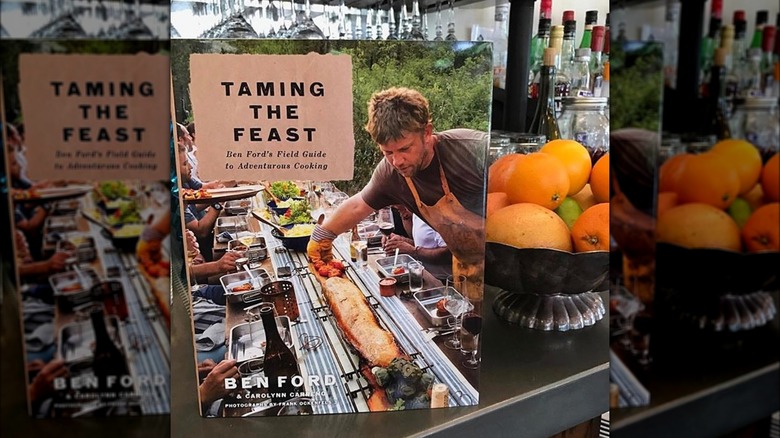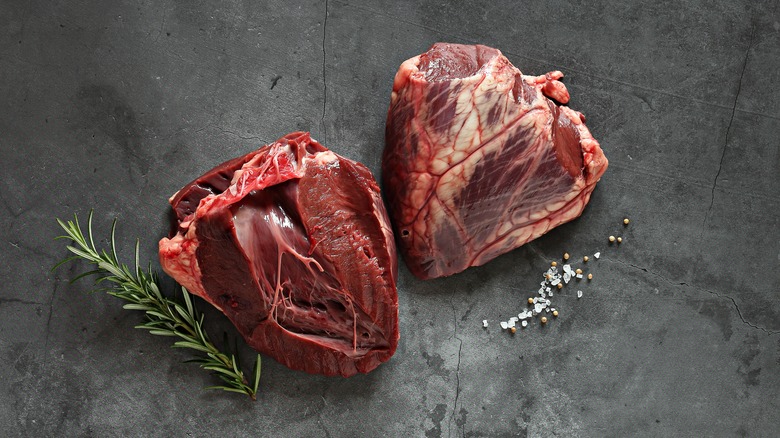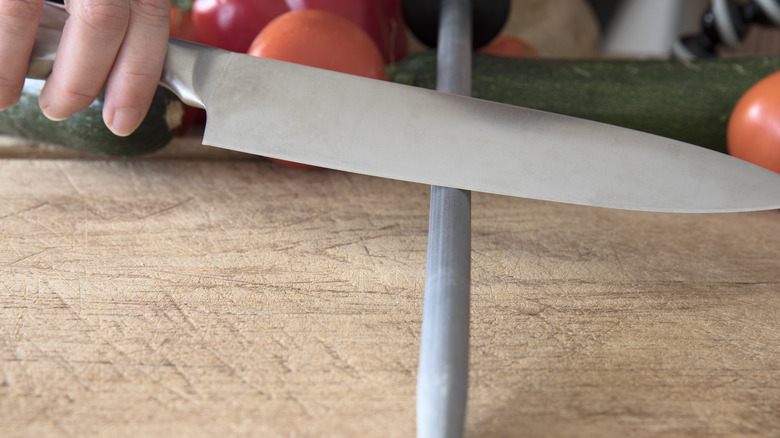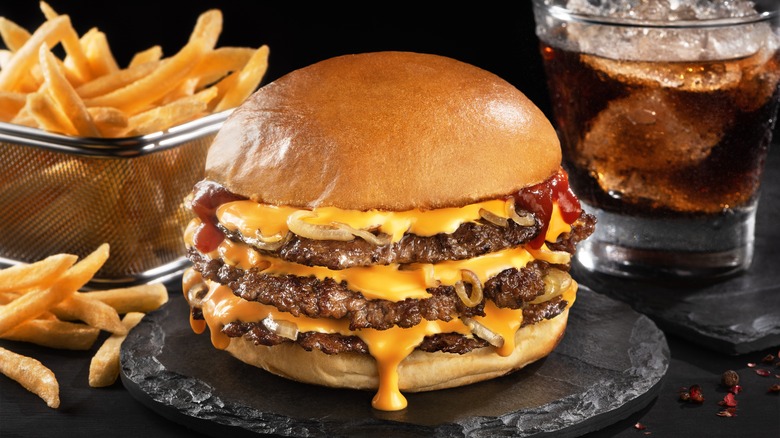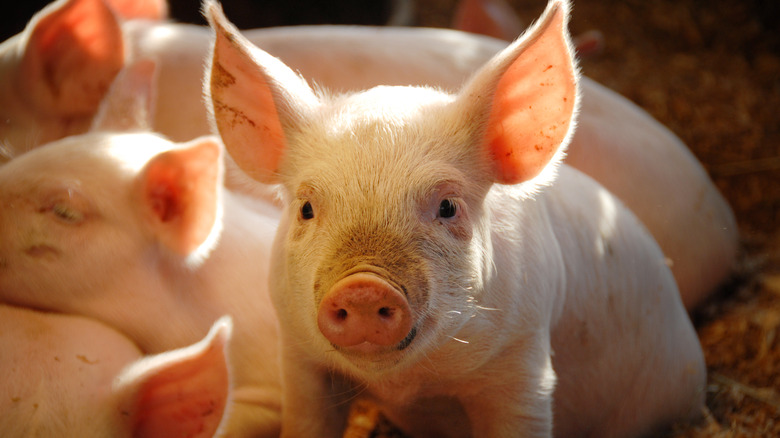Ben Ford Talks The LA Food Scene And His Concerns With Our Food Systems - Exclusive Interview
As a chef, Ben Ford has made a career of blending rugged and refined cooking. His complex background includes a foundation in traditional French cuisine and being an innovator of the gastropub concept with his restaurant Ford's Filling Station.
Describing himself as a "gunslinging chef," Ford brings these classical cooking techniques to the wild and often unpredictable world of outdoor wood-fire cooking. His acclaimed cookbook "Taming the Feast" takes readers outdoors, giving detailed and approachable steps to create a fantastic feast that some could say goes "whole hog."
Hot on the heels of the tenth anniversary of his book, Ford is joining the lineup of the inaugural L.A. Wine & Food Festival as a headlining chef. Ford will be joined by other notable chefs such as Alex Guaraschelli, Andrew Zimmern, and Duff Goldman. We spoke with Ford in an exclusive interview about his upcoming appearance at the event, his future culinary endeavors, and his thoughts on our ever-changing food systems.
The LA Wine & Food Festival
You are one of the headliner chefs for the inaugural LA Wine & Food Festival.
Yeah, I'm excited about it.
What do you plan to make for the event?
I'm doing a leek and Dungeness crab fonduta, which is basically a Latin or Italian term for fondue. Just, it lines up better with some of my heritage, so I tend to navigate towards it. It also doesn't have the support of a roux behind it normally, it's something that's really truly a true cheese sauce, cream sauce. It's probably more leeks and cream and then it's done with Bel Paese cheese, which is a really, almost like sweet mozzarella type of melting cheese. It has Dungeness crab, which is sweet, you never want to cover that up, so those elements work really well with it.
You mentioned that it's not a roux base. What are some of your tips for making sure that you still have that nice creamy, velvety texture?
I think it comes down to cheese, and what I'll do is I'll create some sort of creamy base that has a lot of the four or the five flavors and depth in it already. Then knowing the cheese that I'm going to add to it, I'll play around with that as well. It's always a bit of alchemy because anytime you're reducing something and adding another product to it, there's a little bit of chef-ing involved. Probably the more difficult part of it is actually holding it and doing those things.
I've always traditionally been a risk-taker. Even in these kinds of events, it's probably a difference. It's probably a difference between me and some other chefs is that I've done that throughout my career where I've cooked by the seat of my pants. I was always changing and always evolving and always finding a new sort of thing to get into. I'll do things in events where you probably are pushing it a little bit differently. Some guys will sear all their steaks and put them into their hotbox and they'll hold them that way. I'm more of a grill-at-the-moment kind of guy, it scares most of the people I work with, but it always turns out being better and it's a hell of a lot more fun. I guess it's like a gunslinging chef mentality.
I like that, it's like the cowboy chef.
Cowboy chef, yeah. That's exactly it. Sometimes if you're willing to cook beyond what you've been taught or the bridles you have on you.
Eating out
What are some of the new L.A. restaurants that you enjoy?
I like anything that Ori Menashe is putting out. I think that there seem to be a few chefs in town that are still able to open interesting things and do interesting things. A healthy incubator of work, so to speak. It seems like it's a very difficult time for people to open substantial projects. It's harder for some of the chefs that have been around where maybe there's a certain expectation of the type of restaurant you open, as opposed to a young chef. Those guys, this is a good opportunity for some of the people that really haven't built a brand yet, or are up and coming because there's plenty of opportunity out there as far as inventory and stuff is concerned.
I think that the more seasoned chefs, people who have been up for a while, are still a little bit excited to go back into full-blown exploration with restaurants. I think it's a holding pattern right now, so I wouldn't say that there's that much interesting going out there. I'd say that the experience is definitely suffering, but that there are a few chefs that are still being allowed to do what they can do out there, and there are a few groups that are still doing what they're doing, but that's the change that happens when you have a recession and have things like this.
And with changes in eating habits, there's going to be a weed-out effect. What's interesting about our profession and about our industry is that we've somehow, and I don't even know how this is possible, have continued to innovate for the better, and whatever comes out of these hard times always seems to be something better. It seems to be more of a collaborative kind of thing with the public, and just seems to be for the better. So I know it's hard right now, but things are always hard before it gets better, before things really get great and I'm excited, whatever it goes through next.
As a chef, what's the food that takes you out of the house?
I'm like a culinary locust in some ways. I lived in Nashville for a year and I built a restaurant out there a couple of years ago in the Gulch area. I would go and I would get an Airbnb and would eat my way through that neighborhood, because I don't have a huge radius. L.A., it's becoming more neighborhood-y, which I love. But we're also becoming isolated within our neighborhoods and things like that, so there's not a lot of outreach here.
I live in the Culver City area, or most time I live in the Culver City area. My radius is, I'll go up to Beverly Hills and over to Fairfax area and somewhat into Santa Monica. I love going downtown when I can, but I just have my regular, simple places. I love my taco place that I go to along the road, and I'll drive down to Lincoln for that. I have kids too, so there's some change in habits when it comes to that, but I'm fast, quick. Street food or semi-street food. Vietnamese, Thai, all these wonderful Asian cuisines in Los Angeles that are so influential.
Family cooking
You've stated that your father likes to cook. Is there a particular dish of yours that he loves or something that you enjoyed cooking together growing up?
I just want to put this thing on a menu somewhere, it's just the most simple thing that he used to make for me. This is my memory dish that I go back to, it's not his best dish. He's evolved from this point. I had a very young father, I was born to a 23-year-old father, and so his culinary skills were good. He had worked on a boat in Lake Michigan I believe, or Lake Superior at some point, and had cooked on that boat. And I think he had worked at a pizzeria for about a week. So he had some experience doing these things. Maybe a month, I don't want to discredit him, but it wasn't a very long stint. He would make this grilled cheese sandwich for me on whole wheat with just really good sharp cheddar and tomato and Worcestershire sauce of all things.
I love it and I'm nostalgic for it. I tried to pass that on to my kids and they don't like tomatoes, so a false start, unfortunately. It's going to end up in a cookbook though at some point. We did a Food & Wine shoot not too long ago that was actually really very authentic to our cooking relationship. There's just a lot of chicken being grilled when we get together. If he comes to the restaurant, he'll splurge on that. When we're eating at home, really we eat simple. It's always simple grilled fish or meat and vegetables.
I will tell you one thing, I'm going to out him on this one. I'll give you a juicy thing. He eats off people's plates. All right, there you go. He will order, he will do the six-pack for an actor's diet, but he will eat off people's plates. That's how he cheats.
Taming the Feast
Your book "Taming the Feast," is coming up on its 10th anniversary.
Oh God, that's great. It's still out there being sold, and I see it out on shelves every once in a while. I definitely still think it's due for an update.
If you were going to update the book today, what are some of the dishes you might include?
I think when I did that, I did that book, I was very bridled or very torn, tethered to the concept of the book. I was treating it very much like an art project. The book was done with a group of friends that I would hang out with on weekends, almost in an informal, communal way with artists. It was a friend of mine who had a home that was owned by an architect and a potter back in the '20s. Beautiful light, had a woodworking room, painting room, pottery. Kitchen stunk, but the rest of it was great. My operation was in the kitchen for the most part. Then I also would go and have fun just collaborating, I think it's really good for artists, for chefs to do other things. Get outside of just cooking, hanging out with other artists. We get lost in the business.
A passion for protein
In the book, you highlight several underrated ingredients, such as quail and ham hocks. Is there a protein you've been cooking with lately that you think deserves more attention?
I still have the ability to be extremely resourceful, but I no longer have the ranch where we raised the animals and things so my resourcefulness is a little bit different. I still tend to pick from the cabinet when I'm going out, finding fresh anise and things like that. I still tend to gravitate towards things that need a little help or benefit from a certain cooking technique and things like that. I've been craving beef heart like nobody's business for some reason. It's really wonderful, beautiful dish. I came back to the U.S. and I look for it all the time.
It has to be soaked in milk for a certain amount of time and there's some other stuff that has to be done to make it truly wonderful, but it's a great, underappreciated thing.
Lamb's neck would be another one I love.
What tips do you have for someone who's new to outdoor cooking? Beyond the basics, are there any special gadgets or cooking tools that you should have?
I'm still surprised how few people have just a good working sharp knife, and a good cutting board. Those are the foundational things. The chef should have a good quiver of skills. You should be able to rely on these as much of as possible. There are some really wonderful tools out there and I love them as long as they don't take away from this. You'll find in my kitchen the things that allow the magic to happen with food a little bit more and a little bit less manipulative. Let's say a mortar and pestle versus a blender in some ways.
The blender's fine for certain things. Then there are things when you bring them together that need this, the magic to happen to it. It comes together differently. An aioli made in a mortar and pestle is really different than what it's done in a blender or a different higher manipulation or stronger manipulation. You're not going to get that almost gooey, spoonable quality out of it. You get these almost processed mayonnaise textures out of it when you whip too hard. When you have that mayonnaise, when you have that thing put on top of something, spread on top of something. This is the difference between a craftsman type, a Nancy Silverton, Suzanne Goin type, and more of a person that's doing work, production type thing.
Learning to cut
You mentioned that a lot of people still don't have a good knife. What do you define as a good knife?
One that you are confident in keeping sharp. A lot of people get these one-sided Japanese knives that are wonderful for certain skills. You have to know how to sharpen them, you have to have the right stones to sharpen them. It takes routine maintenance on it. People somehow are afraid of sharp knives. I mean, I think there is still that sort of belief that a sharp knife is less safe somehow than a dull knife to some segment of the population. Or they feel less safe around them, I don't know, like it would bite them or something. [They] don't know that if you nicked that with a dull knife, it's going to be a lot more dangerous, it's going to be a lot more painful, it's going to [take] a lot more longer to heal. You're not going to be as productive in your cooking. There's something really wonderful when you learn how to work with a sharp knife in there and you're no longer afraid of it and it becomes an extension of what you're doing.
I think a good chef's knife and a steel are important. I still use dry stones for the majority of my sharpening for certain things. I have whetstones as well that I carry around with me and stuff like that. I have other straps to go and things like that. There is a difference between putting a new edge on a knife and sharpening it and fine-tuning a knife. When it's time to put an edge on your knife, there are some good people that can do that around town. If you are maintaining your knife throughout time, you shouldn't have to do that too. They can come to your house and pick them up.
The delight of a smash burger
Smash burgers are currently everywhere in L.A. Are you a fan of the trend?
I love smash burgers. I very early on wanted to do a multi-layered burger and didn't know how to do that 20 years ago. It was because it was all about the quality of the meat, how well can you cook a burger, how juicy is it? All these things were really, really important. I think at some point, texture became as equally important.
The smash burger is great, but it's a textural thing. It's because you're getting all that caramelization on it. Most of the time you're getting a smash burger with onions, I think that's a pretty popular one. That's the one I do here at my house, my kids demand it. I think that the onions are great because they supplement back some of the moisture. I love them.
Do you have any tips or special ingredients you like to add when you make them?
I love pickles. I just love pickles, and I love shaved white onion. Shaved super, super thin. I have these. We're a pepper house. I'll wake up in the morning and I'll have a pea, green pepper chili, just eat it. We do a lot of chilies around here. I have these fire and ice jalapeños that I like that we'll put on there. We do smash burgers and have these other fortified jalapeños that I like to put on there as well.
Currently, canned meats are all over TikTok. Do you stock any of them in your pantry?
Like Spam? Or like corned beef? Man, I guess I was one of the beginners of that. I mean, I had an Irish grandfather who liked a lot of that stuff when I was a kid so we would get a lot of it. I'm a fan of musubi. Sunny Blue, by the way, is a place where my kid likes to, where we like to go all the time, which is they have the folded triangle, what are they called? The folded triangle, rice and stuff, they're stuffed with things.
Revisiting our food system
Italy recently banned the sale of lab-grown and cultivated meat, a move that you praised. Could you tell us more about your thoughts on the topic and how it might affect our current food system?
As far as our food systems, we both prioritize that we have a healthy food system. Here, I think that we think about it as being a little bit more that things are sanitized in a certain way. In Italy, they're thinking about the "what have you added to my food" kind of thing. I tend to gravitate towards that.
I think as long as we are caught up in this flash flood, this social strain that we seem to be caught in as a society. It doesn't seem to be at the top of everybody's wishlist, especially in this country. I know there's a lot of people that really are very concerned about it and those [of] us that come in contact with food and are affecting others. When you're cooking at home you're making a personal decision to affect your family or yourself in a certain way. When we make decisions as chefs, we are the gatekeepers for all these half a million people that you're affecting within a year, and you take that very seriously. I hope that there's a switch away from this type of thing.
It certainly would benefit our environment to have more appreciation for our topsoil. It definitely would be better for our farmers. I'm not sure if that's an organic versus conventional thing. I really need to look into that before I can discuss that part.
I mean there's so much good that can come from treating the soil more responsibly. I still am very much a believer in the holistic farming system. When I had Chadwick, my first restaurant, which was named after an organic farmer who brought organic gardening to this country, that restaurant had its own farms and had some foragers and organic foragers and things like that. Then when I went on to do foraging, the whole animal cookery thing, the snout-to-tail part of it really was a continuation of explaining responsible use. Acknowledging the small farmer and how their systems work. It was also about trying to bring craft back into the restaurants and bring butchery back into the restaurants because we had been lost through the middlemen. [We] would figure out a way to make that price just so good that you don't really need to worry about marrying the butchery stuff, all that.
I really believe in this holistic farming system, which connects where the animals are used to fertilize the land and graze the land and that's where the seeds are planted and things are growing. A lot of small farmers they'll call their pig Benjamin. It's a reference to the fact that he's their insurance policy for the mortgage because animals are really important to the farmer. Not only for fertilization aspects of it, but also for the financial benefits of it.
Are there any projects you'd like to share that you have coming up?
I'm looking in Texas right now for opportunities. I can't expose it right now, but yeah, we have some things planned for Texas I'm excited about.
Ben Ford will be a headlining chef at the first-ever L.A. Wine & Food Festival, which will take place from March 1st to 3rd, 2024.
This interview has been edited for clarity.
